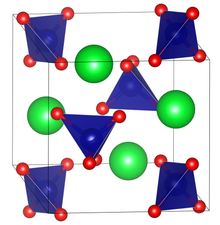Strontium chromate
Appearance

| |

| |
| Names | |
|---|---|
| Other names
C.I. Pigment Yellow 32
C.I. 77839 | |
| Identifiers | |
3D model (JSmol)
|
|
| ECHA InfoCard | 100.029.220 |
| EC Number |
|
PubChem CID
|
|
| RTECS number |
|
| UNII | |
CompTox Dashboard (EPA)
|
|
| |
| |
| Properties | |
| SrCrO4 | |
| Molar mass | 203.614 g/mol |
| Appearance | yellow powder |
| Density | 3.353 g/cm3 |
| 0.12 g/100 mL (15 °C) 3 g/100 mL (100 °C) | |
| Solubility | Soluble in dilute acids and ammonia |
| −5.1·10−6 cm3/mol | |
| Structure | |
| monoclinic | |
| Hazards | |
| Lethal dose or concentration (LD, LC): | |
LD50 (median dose)
|
3118 mg/kg (rat, oral) |
| Related compounds | |
Other cations
|
Magnesium chromate Barium chromate |
Except where otherwise noted, data are given for materials in their standard state (at 25 °C [77 °F], 100 kPa).
| |
Strontium chromate is an inorganic chemical compound with the formula SrCrO4.
Preparation
Strontium chromate is prepared from strontium chloride and sodium chromate, or from strontium carbonate and sodium dichromate.
Reactions
Strontium chromate is approximately 30 times more soluble in water at 100 °C than at room temperature. Therefore, the yellow strontium chromate can be suspended in a hot solution of a soluble sulfate to digest until fully converted to the much less soluble and white strontium sulfate, leaving the chromate or dichromate in solution.
Uses
- Corrosion inhibitor in pigments
- In electrochemical processes to control sulphate concentration of solutions
- Colorant in polyvinyl chloride resins
- Pyrotechnics[1]
- Aluminium flake coatings
- As an anti-corrosive primer for zinc, magnesium, aluminium, and alloys used in aircraft manufacture.
- As a pigment used in oil painting named strontium yellow.[1]
References
- ^ a b "Strontium yellow". CAMEO database. Museum of Fine Arts, Boston. 2022-06-06. Retrieved 2023-02-14.
